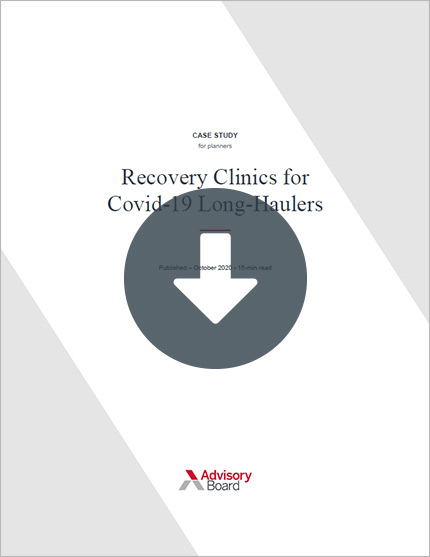Auto logout in seconds.
Continue LogoutCognitive dysfunction, or "brain fog," seen in patients with long Covid can last more than seven months, according to a recent study published in JAMA Network Open.
Recovery clinics for Covid-19 long-haulers
Study details
For the study, researchers at the Icahn School of Medicine at Mount Sinai gave tests to 740 patients who were part of a registry run by Mount Sinai. The average age of the patient group was 49, all had tested positive for the coronavirus, and none had a history of dementia.
Just over half the patients had been treated for Covid-19 as outpatients, while 27% had been hospitalized and 22% were treated in an ED.
After adjusting results for race, ethnicity, smoking, BMI, comorbidities, and depression, the researchers found a fairly high rate of cognitive dysfunction 7.6 months after a patient contracted the coronavirus. The most common cognitive impairment reported was difficulty storing new memories, which affected nearly a quarter of patients.
Meanwhile, 23% of patients had difficulties with memory recall, 20% with category fluency, 18% with processing speed, 16% with executive functioning, and 15% with phonemic fluency.
The researchers also found that patients hospitalized with Covid-19 were more likely to have difficulties with attention, executive functioning, category fluency, memory encoding, and memory recall than those treated as outpatients.
Similarly, patients treated in the ED were more likely to have problems with category fluency and memory encoding than those treated as outpatients, the researchers found.
Reaction
The study's results are consistent with other research on cognitive dysfunction in long Covid patients. For example, one study published in Lancet Psychiatry in April, found that as many as 33% of people with Covid-19 experienced long-term mental health or neurological symptoms.
"The relative sparing of memory recognition in the context of impaired encoding and recall suggests an executive pattern," the authors of the JAMA study wrote. "This pattern is consistent with early reports describing a dysexecutive syndrome after Covid-19 and has considerable implications for occupational, psychological, and functional outcomes."
Igor Koralnik, chief of the division of neuro-infectious disease and global neurology at Northwestern Medical Center, said the study results are also consistent with what his hospital has seen. According to Koralnik, some Covid-19 patients have ended up with cognitive impairments so severe they were unable to care for themselves after being discharged from the hospital.
Koralnik added that, while it's unsurprising patients who had cases of Covid-19 so severe they needed ventilation ended up with cognitive impairments, it's unclear why younger patients who had mild cases of Covid-19 would be affected by cognitive problems. And on top of that, it's also unclear when, or if, these patients' symptoms will improve, Koralnik said.
Helen Lavretsky, a professor of psychiatry and director of the UCLA Post-Covid Clinic, said seeing young patients with severe mental impairments is "heartbreaking."
Some patients say "they cannot function; they can't think; their memory is impaired; they get confused when they drive places, that they don't know how they got there," Lavretsky said.
As it stands, the only treatment for these cognitive impairments is therapy, according to Tracy Vannorsdall, an associate professor of psychiatry and behavioral science at Johns Hopkins Medicine.
Therapists will ask patients to describe their strengths and weaknesses in an effort to design a program to teach patients how to utilize their strengths to balance out their weaknesses, Vannorsdall said.
"These folks expect to return to their work, family, and community and to engage in activities that are meaningful," Vannorsdall said. "They want to be at their cognitive best." (Carroll, NBC News, 10/23; George, MedPage Today, 10/22; Howard, CNN, 10/22)
Download the case study

Several health systems have set up dedicated recovery clinics to help treat and coordinate care for long-haulers. This resource provides an overview of Covid-19 recovery clinic models pioneered by two early adopters—The University of Iowa Hospitals and Clinics and the University of Pennsylvania Medicine—and considerations for assessing whether it is a model you should pursue.
Don't miss out on the latest Advisory Board insights
Create your free account to access 1 resource, including the latest research and webinars.
Want access without creating an account?
You have 1 free members-only resource remaining this month.
1 free members-only resources remaining
1 free members-only resources remaining
You've reached your limit of free insights
Become a member to access all of Advisory Board's resources, events, and experts
Never miss out on the latest innovative health care content tailored to you.
Benefits include:
You've reached your limit of free insights
Become a member to access all of Advisory Board's resources, events, and experts
Never miss out on the latest innovative health care content tailored to you.
Benefits include:
This content is available through your Curated Research partnership with Advisory Board. Click on ‘view this resource’ to read the full piece
Email ask@advisory.com to learn more
Click on ‘Become a Member’ to learn about the benefits of a Full-Access partnership with Advisory Board
Never miss out on the latest innovative health care content tailored to you.
Benefits Include:
This is for members only. Learn more.
Click on ‘Become a Member’ to learn about the benefits of a Full-Access partnership with Advisory Board
Never miss out on the latest innovative health care content tailored to you.
